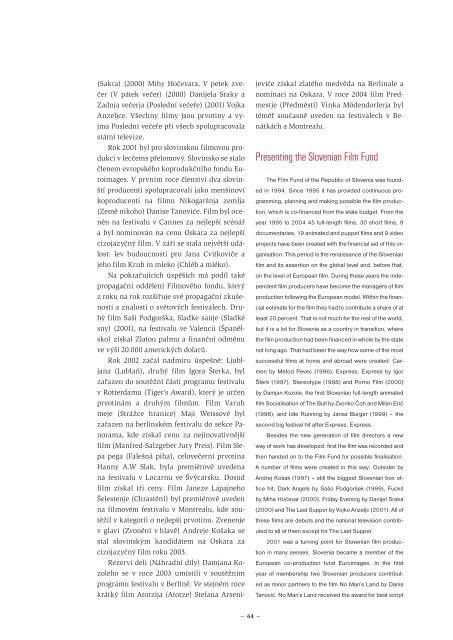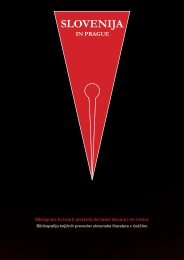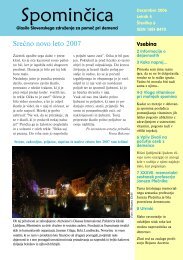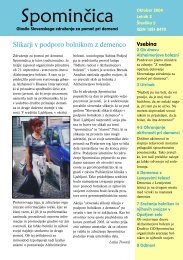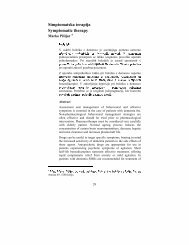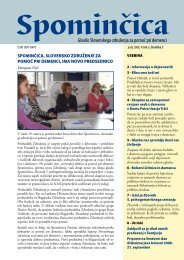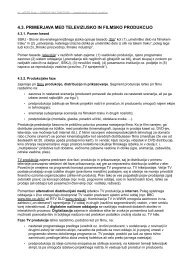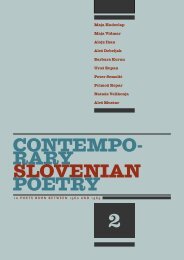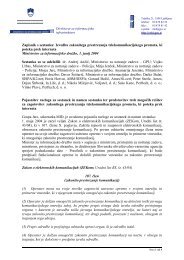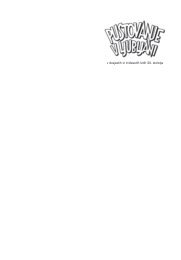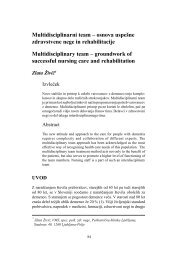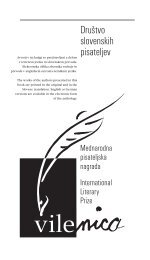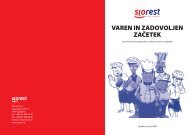Slovo úvodem - Ljudmila
Slovo úvodem - Ljudmila
Slovo úvodem - Ljudmila
Create successful ePaper yourself
Turn your PDF publications into a flip-book with our unique Google optimized e-Paper software.
(Sakra) (2000) Mihy Hočevara, V petek zvečer<br />
(V pátek večer) (2000) Danijela Sraky a<br />
Zadnja večerja (Poslední večeře) (2001) Vojka<br />
Anzeljce. Všechny filmy jsou prvotiny a vyjma<br />
Poslední večeře při všech spolupracovala<br />
státní televize.<br />
Rok 2001 byl pro slovinskou filmovou produkci<br />
v lecčems přelomový. Slovinsko se stalo<br />
členem evropského koprodukčního fondu Euroimages.<br />
V prvním roce členství dva slovinští<br />
producenti spolupracovali jako menšinoví<br />
koproducenti na filmu Nikogaršnja zemlja<br />
(Země nikoho) Danise Tanoviće. Film byl oceněn<br />
na festivalu v Cannes za nejlepší scénář<br />
a byl nominován na cenu Oskara za nejlepší<br />
cizojazyčný film. V září se stala největší událost:<br />
lev budoucnosti pro Jana Cvitkoviče a<br />
jeho film Kruh in mleko (Chléb a mléko).<br />
Na pokračujících úspěších má podíl také<br />
propagační oddělení Filmového fondu, který<br />
z roku na rok rozšiřuje své propagační zkušenosti<br />
a znalosti o světových festivalech. Druhý<br />
film Saši Podgorška, Sladke sanje (Sladké<br />
sny) (2001), na festivalu ve Valencii (Španělsko)<br />
získal Zlatou palmu a finanční odměnu<br />
ve výši 20.000 amerických dolarů.<br />
Rok 2002 začal nadmíru úspešně: Ljubljana<br />
(Lublaň), druhý film Igora Šterka, byl<br />
zařazen do soutěžní části programu festivalu<br />
v Rotterdamu (Tiger’s Award), který je určen<br />
prvotinám a druhým filmům. Film Varuh<br />
meje (Strážce hranice) Maji Weissové byl<br />
zařazen na berlínském festivalu do sekce Panorama,<br />
kde získal cenu za nejinovativnější<br />
film (Manfred-Salzgeber Jury Preis). Film Slepa<br />
pega (Falešná piha), celovečerní prvotina<br />
Hanny A.W Slak, byla premiérově uvedena<br />
na festivalu v Locarnu ve Švýcarsku. Dosud<br />
film získal tři ceny. Film Janeze Lapajneho<br />
Šelestenje (Chrastění) byl premiérově uveden<br />
na filmovém festivalu v Montrealu, kde soutěžil<br />
v kategorii o nejlepší prvotinu. Zvenenje<br />
v glavi (Zvonění v hlavě) Andreje Košaka se<br />
stal slovinským kandidátem na Oskara za<br />
cizojazyčný film roku 2003.<br />
Rezervi deli (Náhradní díly) Damjana Kozoleho<br />
se v roce 2003 umístili v soutěžním<br />
programu festivalu v Berlíně. Ve stejném roce<br />
krátký film Atorzija (Atorze) Stefana Arsenijeviće<br />
získal zlatého medvěda na Berlinale a<br />
nominaci na Oskara. V roce 2004 film Predmestje<br />
(Předměstí) Vinka Mödendorferja byl<br />
téměř současně uveden na festivalech v Benátkách<br />
a Montrealu.<br />
Presenting the Slovenian Film Fund<br />
The Film Fund of the Republic of Slovenia was founded<br />
in 1994. Since 1995 it has provided continuous programming,<br />
planning and making possible the film production,<br />
which is co-financed from the state budget. From the<br />
year 1995 to 2004 45 full-length films, 30 short films, 9<br />
documentaries, 19 animated and puppet films and 9 video<br />
projects have been created with the financial aid of this organisation.<br />
This period is the renaissance of the Slovenian<br />
film and its assertion on the global level and, before that,<br />
on the level of European film. During these years the independent<br />
film producers have become the managers of film<br />
production following the European model. Within the financial<br />
estimate for the film they had to contribute a share of at<br />
least 20 percent. That is not much for the rest of the world,<br />
but it is a lot for Slovenia as a country in transition, where<br />
the film production had been financed in whole by the state<br />
not long ago. That had been the way how some of the most<br />
successful films at home and abroad were created: Carmen<br />
by Metod Pevec (1996), Express, Express by Igor<br />
Šterk (1997), Stereotype (1998) and Porno Film (2000)<br />
by Damjan Kozole, the first Slovenian full-length animated<br />
film Socialisation of The Bull by Zvonko Čoh and Milan Erič<br />
(1998), and Idle Running by Janez Burger (1999) – the<br />
second big festival hit after Express, Express.<br />
Besides the new generation of film directors a new<br />
way of work has developed: first the film was recorded and<br />
then handed on to the Film Fund for possible finalisation.<br />
A number of films were created in this way: Outsider by<br />
Andrej Košak (1997) – still the biggest Slovenian box office<br />
hit, Dark Angels by Sašo Podgoršek (1999), Fuckit<br />
by Miha Hočevar (2000), Friday Evening by Danijel Sraka<br />
(2000) and The Last Supper by Vojko Anzeljc (2001). All of<br />
these films are debuts and the national television contributed<br />
to all of them except for The Last Supper.<br />
2001 was a turning point for Slovenian film production<br />
in many senses. Slovenia became a member of the<br />
European co-production fund Euroimages. In the first<br />
year of membership two Slovenian producers contributed<br />
as minor partners to the film No Man’s Land by Danis<br />
Tanović. No Man’s Land received the award for best script<br />
64


